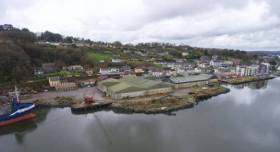Displaying items by tag: Urged to Buy
#WaterfrontProperty - Victoria Dockyard an eight-acre site in Passage West which is up for sale needs to be purchased by the State or Cork County Council in order for a development that benefits the town centre to be built there, TDs have warned.
As the Evening Echo reports, the site was once home to the Royal Victoria Dockyard where ships were built for over 100 years and where over 1,000 people were employed during WW1. It contains several hundred metres of road frontage, three access points and six terraced houses encompassed in a stone wall boundary.
Previous owners Howard Holdings had planned to build a hotel on the site after a €25m purchase in the early 2000s but then sold it to the Doyle Shipping Group (DSG) for €2.75m. It has recently been utilised as a steel scrapyard and is being offered on the open market for around €3.5m.
The current occupier would have to move out once the sale is completed and the buyer would be free to use it as they see fit within planning regulations. The site has been on the open market since September of last year.
It is unlikely its current use will continue once it is sold. To read more on the story click here.
The private quay at Passage West is where last month Afloat.ie featured an Irish owned cargoship involved (not in scrap-trading) but the loading of wood-chip bound for Scotland.





























































